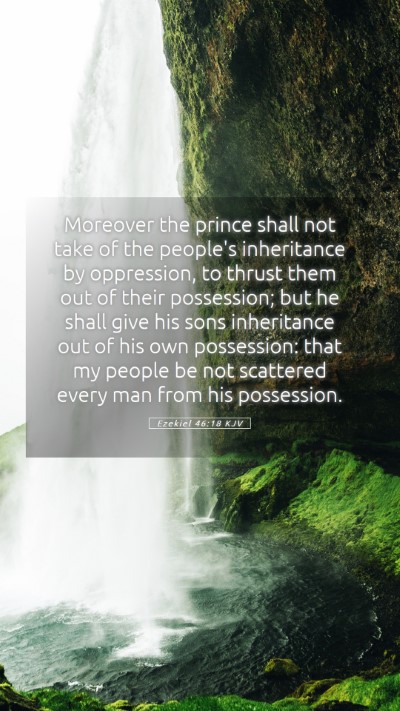Understanding Ezekiel 46:18
Ezekiel 46:18 delves into the responsibilities of the leaders in the sacred spaces of worship within ancient Israel. This verse provides insight into the role of rulers in relation to the temple and the people, emphasizing their duty to avoid misusing their authority.
Bible Verse Commentary and Interpretation
To grasp the depth of this verse, we combine insights from esteemed public domain commentaries:
Matthew Henry's Commentary
Matthew Henry elucidates that this verse underscores the expectation that leaders should not exploit their position for personal gain or neglect their duties towards the people. He highlights that the prince in this context represents a spiritual authority who acts as a shepherd for the congregation. Henry emphasizes that proper leadership is marked by accountability and serves as an example for others.
Albert Barnes' Notes
Albert Barnes focuses on the idea that the prince must not be a source of detriment to the spiritual welfare of the people. He explains that taking land or goods from the people deprives them of their rights, which is contrary to the principle of just leadership. Barnes interprets this as a warning against the greed and corruption that often infiltrate leadership roles, urging rulers to instead focus on protecting and providing for their subjects.
Adam Clarke's Commentary
Adam Clarke elaborates on the intricacies of temple worship and the responsibilities placed on those in leadership. He notes that the verse implies a covenantal obligation where the rulers are guardians of God's people and must ensure their well-being both spiritually and physically. Clarke adds that this serves as a prophetic commentary on the nature of righteous leadership as seen in the coming Messiah, embodying the ideal of care and protection for all.
Key Themes and Insights
- Responsibilities of Leadership: This verse portrays the essential duties of leaders to act justly and protect those in their charge.
- The Role of the Temple: It highlights the significance of the temple as a sacred place and the expectations of those who oversee its activities.
- Accountability: Leaders are cautioned against exploiting their authority, reflecting the need for moral integrity.
- Spiritual Oversight: The focus on spiritual stewardship emphasizes the leaders’ role as shepherds in guiding their communities.
Related Bible Cross References
- Jeremiah 22:3 - A call to social justice and care for the vulnerable.
- Ezekiel 34:2-4 - God condemns the shepherds who fail to care for their sheep.
- 1 Peter 5:2-3 - Instructions for church leaders on leading willingly and not for dishonest gain.
Application and Reflection
Reflecting on Ezekiel 46:18 allows us to contemplate our own positions of influence, whether in church, family, or community. The call for integrity and care resonates in personal applications:
- Question Authority: Evaluate how those in power affect your spiritual well-being.
- Leadership Model: Strive to embody traits exemplified in this verse within your roles of influence.
- Community Care: Actively engage in supporting those who are often overlooked or marginalized.
Conclusion
Ezekiel 46:18 serves as a profound reminder of the ethical foundations of leadership within a spiritual context. The insights from public domain commentaries suggest that our understanding of scriptural passages can deepen our appreciation for their relevance in contemporary life. As you study the meaning of Bible verses and engage in your Bible study resources, consider how these lessons on leadership and responsibility can guide your actions today.


